| Srl | Item |
| 1 |
ID:
174943
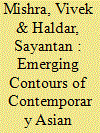

|
|
|
|
|
| Summary/Abstract |
This article intends to look at how contemporary and future Asian connectivity linkages are likely to impact Asian geopolitics and geo-strategy. While China has dominated the contemporary connectivity discourse with its Belt and Road Initiative (BRI), other players such as Australia, India, Japan and the USA are engaged in their own connectivity bids which often converge and intersect in the region. As a result, the countries involved in the Indo-Pacific cross-linkages are tacitly entering a game of one-upmanship. Influence through connectivity linkages has also shifted the discourse around balance of power for countries to balance of influence. It is in this context that initiatives such as the Mausam find centrality in the country’s changing outlook. This article attempts to look at Asian connectivity from a dual perspective of economic competition, on one hand, and strategic calculations, on the other hand. The scope of the article is limited to analysing China, India and Japan as leading Asian countries in the emerging connectivity competition, besides the USA as the most important external players in Asian connectivity geopolitics and geo-strategy.
|
|
|
|
|
|
|
|
|
|
|
|
|
|
|
|
| 2 |
ID:
188405


|
|
|
|
|
| Summary/Abstract |
This article traces the historical roots of contemporary housing struggles in Mumbai, Delhi and Kolkata, emphasising the long-term impacts of post-Partition refugee resettlement. Analysing Partition as a ‘critical event’, we discuss the distinct ways in which local administrators, political leaders and city residents responded to the arrival of hundreds of thousands of refugees, traumatised, impoverished and made homeless by Partition. As they responded, city boundaries were expanded, housing policies were revised and new political repertories were established. Noting both the ruptures and continuities, we present a framework for analysing the impacts of critical events on urban politics and housing rights.
|
|
|
|
|
|
|
|
|
|
|
|
|
|
|
|
| 3 |
ID:
163989


|
|
|
| 4 |
ID:
182613
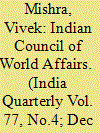

|
|
|
|
|
| Summary/Abstract |
This commentary recounts the important hallmarks of the institutional history of the Indian Council of World Affairs, one of India’s first publicly funded research institutions. It presents a brief account of its long history since 1943, its career in acquiring prominence, its decline and its revival. This commentary takes off from its recently published institutional history (Raghavan, T., & Mishra, V. [2021]. Sapru House: A story of institution building in world affairs).
|
|
|
|
|
|
|
|
|
|
|
|
|
|
|
|
| 5 |
ID:
157802


|
|
|
|
|
| Summary/Abstract |
There is a new conception of India's security taking shape in the Asian maritime domain. India's new evocation of security creates a seamless expanse of its interests from continental homeland transcending the coastal areas and extending to the maritime expanse of the Indian Ocean Region (IOR). This new approach of India seeks to secure its interests through an effective mix of soft and hard power built on a conception of security outreach that extends to the high seas. As the largest regional navy in South Asia with ever enlarging pan-Asian interests, India's attempt to find the right balance between adopting protective and assertive policies in the Asian maritime domain is gradually emerging as its fundamental strategic dilemma. India's approach to coastal security, territorial waters and even the exclusive economic zone signals a recalibration that repositions security, trade, connectivity and most of all counter-strategies to regain influence in the region.
|
|
|
|
|
|
|
|
|
|
|
|
|
|
|
|
| 6 |
ID:
159620
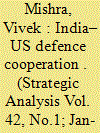

|
|
|
|
|
| Summary/Abstract |
Over the last decade or so, especially during much of Barack Obama’s presidential tenure, the defence sector has become the focus area of cooperation between India and the US. India’s engagement with the US in the area of defence is riding on a new-found realism that drives both countries’ strategic aspirations. This article attempts to recount important developments between India and the US in the defence sector in the last decade, primarily focussing on the developments during the Obama administration, and analyse their strategic implications for both the countries. The article ends with a brief assessment of transition under Trump presidency.
|
|
|
|
|
|
|
|
|
|
|
|
|
|
|
|
| 7 |
ID:
152927


|
|
|
| 8 |
ID:
178596
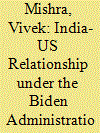

|
|
|
| 9 |
ID:
154583


|
|
|
|
|
| Summary/Abstract |
There has been a clear growing maritime intent in India–US cooperation in the past few years and bilateral interests have come to converge, due to both the individual countries' interests and regional common goals. As an economically and militarily developing country, India seeks to expand its strategic influence the Indian Ocean Region (IOR). It also comes across as the most stable and powerful country in the region that could support the long-term interests of the US in the region. The US sees India as a significant balancer of China in the region, and the Indian Ocean as a maritime opponent to the South China Sea. As the US–China rivalry continues in the Asia-Pacific, the Indian Ocean remains the stable pivot from where the Asian power balance will be string-held. More importantly, going forward the Indian Ocean could be divided into maritime sub-regions of influence based on two emerging opposite power axes.
|
|
|
|
|
|
|
|
|
|
|
|
|
|
|
|
| 10 |
ID:
169382


|
|
|
| 11 |
ID:
149148
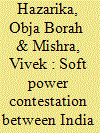

|
|
|
| 12 |
ID:
149513
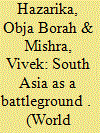

|
|
|
| 13 |
ID:
144559
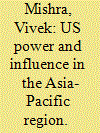

|
|
|
|
|
| Summary/Abstract |
Recently, the nature of the presence of the US in the Asia-Pacific has undergone significant changes. At least three developments—the rise of an economically and militarily resurgent China, a renewed counter-strategic approach by the US to rebalance its engagements with its close regional allies like Japan, the Philippines, South Korea and Australia, and the US’ efforts to expand and extend strategic cooperation with India and Vietnam—show that there are new emerging differences between the US and its four major non-NATO allies in the Asia-Pacific. These developments point towards declining strategic reciprocity of these nation states with the US and vice versa as they seek relative autonomy in their engagements with Beijing along with other extra-regional powers. While this has tacitly mandated the expansion of the US alliance system from the core Asia-Pacific region westwards to include the Indo-Pacific, the Indian Ocean and a few other Southeast Asian nations, it has also depicted the insufficiency of the US’ alliance with non-NATO allies in meeting its somewhat altered regional objectives since the turn of the century.
|
|
|
|
|
|
|
|
|
|
|
|
|
|
|
|